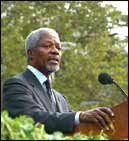
Kofi Annan,
Secretary-General of the United Nations |
Study Update: ‘Documenting Contributions of Civil Society Organisations to the Well-Being of Families’ @ www.20yearsIYF.org to observe the 20th Anniversary of IYF in 2014.
United Nations A/59/176
General Assembly
Report of the Secretary-General
II. The changing circumstances of families
4. The family has a continuing and crucial role in social and human development as well as in provision of care and support to individuals. Strong family bonds have always been part of most societies, and families in most places continue to make important contributions to social and economic well-being. Indeed, families have major, albeit often untapped potential to contribute to national development and to the achievement of major objectives of every society and of the United Nations, including the eradication of poverty and the creation of just, stable and secure societies. Yet, the contribution of families in achieving these objectives, including the goals established in the major conferences and summits of the past decade and in the United Nations Millennium Declaration (see General Assembly resolution 55/2), has generally been overlooked.
5. Part of the reason for this may be that families themselves are experiencing tremendous change. During the 10 years following the observance of the International Year of the Family, social and economic forces have continued to have a significant impact on countries, communities and families. One of the activities of the Department of Economic and Social Affairs undertaken to mark the observance of the tenth anniversary was the publication of the study entitled Major Trends Affecting Families. The study considered the situation of families from a regional perspective, and focused, in particular, on a number of issues that have, and are expected to continue to have, major impacts on families in the years ahead: (a) changes in family structure; (b) migration; (c) demographic ageing and retirement; (d) the HIV/AIDS pandemic; and (e) globalization. It revealed that each of these issues is affecting families to a greater or lesser extent in virtually every country of the world. With increasing social and economic change, globalization and pressures from HIV/AIDS, migration and urbanization, families have faced increasing pressures and family structures have experienced changes. The tendency has been to have smaller families with fewer children, with a weakening of extended family relationships based on mutual obligation and shared responsibility. These changes have sometimes led to social problems as families have become less able - or willing - to provide for the needs of all their members. Many Governments attach great importance to strengthening families, focusing, among other things, on supporting family self-sufficiency, promoting a nurturing and caring environment within the family and preventing domestic violence.
(For the complete text cf. )
United Nations A/59/176
General Assembly
Fifty-ninth session
Social development, including questions relating
to the world social situation and to youth, ageing,
disabled persons and the family
Preparations for and observance of the tenth anniversary of
the International Year of the Family in 2004
Report of the Secretary-General
|